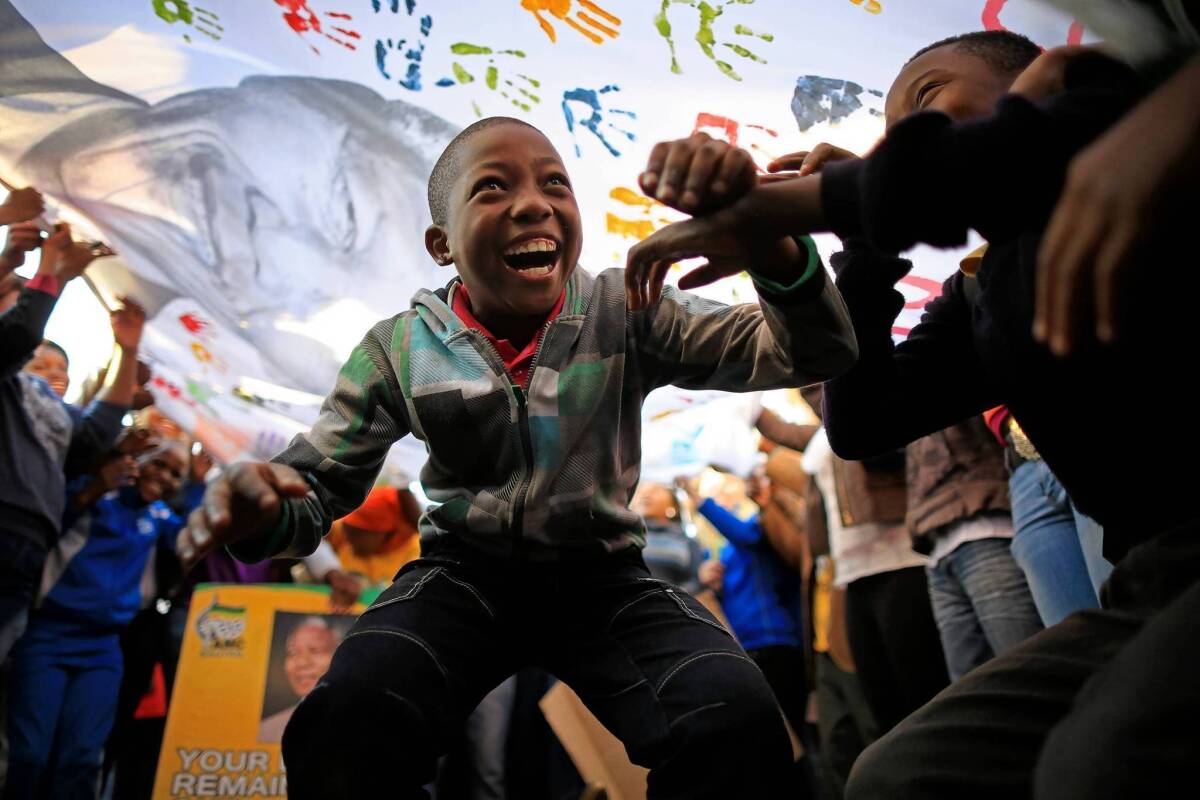South Africa marks Mandela’s 95th birthday with joy and gratitude

- Share via
PRETORIA, South Africa — For one day, South Africans remembered who they were: Nelson Mandela’s optimistic, exuberant children, a racially diverse Rainbow Nation that never gives up.
In recent weeks, the country has confronted the somber reality that Mandela was hovering near death. On Thursday, as he marked his 95th birthday in a Pretoria hospital, the magic was back.
The man affectionately called Madiba could smile but not speak, underscoring how frail he is. But after reports of a remarkable improvement that might allow him to go home soon, the sorrow lifted. South Africans united in soaring, joyful celebration.
PHOTOS: Worldwide celebrations for Nelson Mandela’s 95th birthday
As usual, Desmond Tutu, the former Anglican archbishop of Cape Town and a fellow Nobel laureate, put it best:
“He makes us walk tall.” Mandela, “even in old age, has the incredible capacity of throwing us together, people of different political persuasions and color, race or whatever. It’s been fantastic, even if we’re feeling sad.
“It’s just fantastic to see his amazing magnetic power.”
For many, the day was about memories. When the national anthem was played, thousands of times around South Africa, it crystallized memories of the day a new flag was raised on May 10, 1994, when Mandela became South Africa’s first democratically elected and first black president.
For others, it was about service — donating time to work at a local community center, pick up trash or bicycle in a fundraiser. Tutu painted the wall of a local school.
Many marked the day by going to a site associated with Mandela, such as his former house in Soweto or new house in upscale Sandton, or the sprawling tribute wall outside the hospital where he’s being treated, with its extravagant heaps of flowers, letters and artwork. People danced, swayed, ululated and sang, all accompanied by the blasts of the plastic horns known as vuvuzelas. At times the atmosphere outside his hospital resembled a giant street party.
“He means life. He brought so much. He means life. That’s what he brought for all of us.” — Nthabiseng Moloi, 41, an unemployed Soweto woman with eight children to support.
Moloi was drawn by a mystical need to “feel his spirit,” so she went to his former house on Vilakazi Street in Soweto.
“I feel it. I feel it a lot. A lot happened around here,” she said, remembering the protests and police killings and abductions of activists during apartheid. “It was a very long journey. I remember when I was young, when we struggled, how it would hurt to hear that somebody you knew was shot. How my uncle was arrested.”
The arc of Mandela’s life has included the struggle against apartheid; hard, soul-crushing years in prison; the joy of his release and election as president. But it has also seen the tragedy of the AIDS epidemic; corruption in the ruling African National Congress; and government failure to deliver on healthcare, jobs, education and fighting violent crime. The infant mortality rate doubled between 1998 and 2011.
Many of those who celebrated Thursday have suffered the kind of terrible hardships that are still commonplace in South Africa’s townships: family members who died too young of AIDS or in car accidents, like two of Mandela’s own children.
Jaqueline Kekana, a 60-year-old pensioner, has suffered tragic losses that are sadly typical. Two of her three children are dead, including a daughter who was shot in the stomach by a former lover and later killed herself in fear, and a son who died of meningitis. Her husband died in a car crash.
She supports two grandchildren and her 81-year-old mother.
But when she rose Thursday morning, she put on her best outfit: a skirt and head scarf sporting a Mandela print, normally reserved for weddings. She felt a surge of calm joy as she dressed.
“I felt happiness, just filled with happiness,” she said.
Like Moloi, she decided that on what is proclaimed Mandela Day, she had to get as close as she could to the man. Standing outside his hospital, she said she could feel his presence.
“This is a very special day,” she said. “I shed a tear when we sang the national anthem.”
When her daughter was shot, she recalled, her white Afrikaner neighbors called an ambulance and later helped her.
“They are poor people. They are my family,” she said. To her, that attitude is Mandela’s gift to the country.
“He has made me what I am today. I’m free because of him.” — Timothy Sepeng, 50, driver in Pretoria.
During apartheid, Sepeng’s father worked as a casual electrician while the boy played soccer in dusty township streets, using a ball made of plastic.
He wants his five children to go to college and have opportunities he was denied. But he cannot afford it.
“It makes me feel that the rich are busy enriching themselves. And the poor will remain poor,” he said.
Still, even the small freedoms — like falling in love with traditionally white sports such as rugby and cricket — are wonderful, he said.
“He has done everything, this man.... We are walking free, walking free.” — Joel Modisane, 44, unemployed Soweto resident.
Modisane has the desperate threadbare look of a man who hasn’t had a job for four years. He shrugs it off, chewing a match with a burned end.
“When there’s work, there’s work. When there’s no work, there are not jobs,” he says.
Critics accuse Mandela’s ruling ANC party of betraying his legacy through its corruption and inability to deliver services. But on Mandela Day, nobody wanted to talk about that.
Asked who was to blame for high unemployment, Modisane just laughed. “It’s no one’s fault.”
More to Read
Sign up for Essential California
The most important California stories and recommendations in your inbox every morning.
You may occasionally receive promotional content from the Los Angeles Times.













